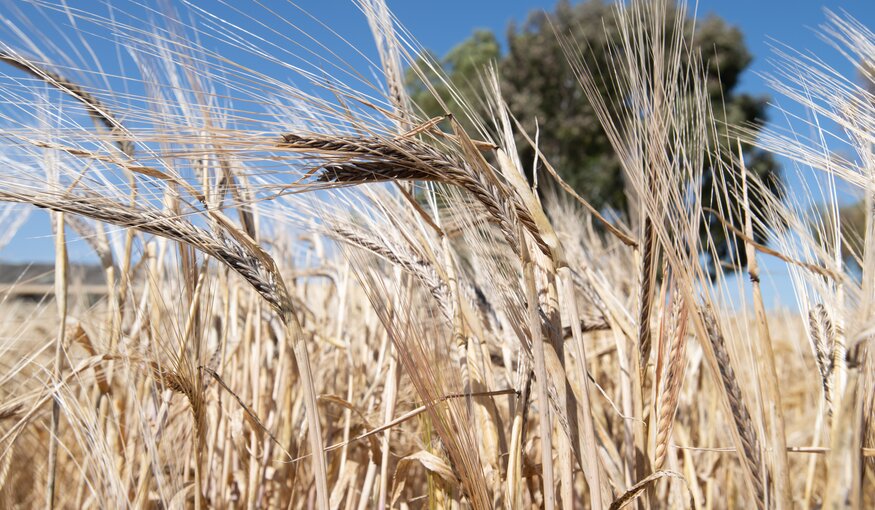Adapting Crops to Climate Change: Paving the Way for More Resilient Agriculture
 Barley. DIIVA Project, Marchouch, Morocco. Photo: Michael Major/Crop Trust
Barley. DIIVA Project, Marchouch, Morocco. Photo: Michael Major/Crop TrustNewly Published Research Shows When the Growing Gets Tough, the Tough Get Pre-Breeding
The successful results of a major global initiative to use crop wild relatives in breeding new, improved crop varieties that can withstand the effects of climate change are detailed in the latest edition of Crop Science. The special edition is devoted to research conducted by the Crop Trust project “Adapting Agriculture to Climate Change: Collecting, Protecting and Preparing Crop Wild Relatives”, known as the Crop Wild Relatives Project.
Crop wild relatives are undomesticated species of plants that are genetically close enough to domesticated crops to be bred with them. Crop wild relatives often look very different from their cultivated counterparts—and are normally not even edible—but they are gaining increased attention and respect as a potentially valuable source of the genes needed to breed new, hardier seeds. These genes can be linked to critical traits like increased nutritional value, tolerance to drought, salty soil and extreme heat and resistance to pests and diseases. Identifying, conserving and harnessing such traits is essential to developing crops that can cope with the extremes brought on by climate change and feeding the planet.
“This special edition of Crop Science on the successful use of crop wild relatives in pre-breeding is incredibly significant,” says Benjamin Kilian, who leads the Crop Wild Relatives Project, which is funded by the Government of Norway. “The crops in these projects provide much of the sustenance that humanity relies on. Without developing varieties that can better tolerate a changing climate, many of the foods we see regularly on our plates could disappear.”
Humans have been taming the wild for millennia, domesticating plants to serve as food, or forage. But plant domestication has narrowed the genetic diversity of our crops in comparison with their wild ancestors, with scientific plant breeding continuing this process in recent decades. The less genetic diversity crops have, the lower their potential to adapt to challenges, such as shifts in seasons, more intense rains, droughts, pests, and other effects of the changing climate.
“If we want to have crops that can cope with these challenges—if we want to ensure an ongoing food supply—then we need to go back to the wild, and give pre-breeding with crop wild relatives long-term investment,” says Kilian.
Scientists on the project who published papers in this special issue studied carrot, banana, durum wheat, sorghum, eggplant, alfalfa, sweetpotato, barley, finger millet, grass pea, pearl millet, chickpea and rice. They identified where they were missing wild species in genebank collections, evaluated them for useful traits like heat tolerance, pest resistance or even combinations of traits.
“Together, these findings add up to impressive progress—and they provide clear evidence that the benefits of pre-breeding are worth the time, effort and expense,” says Kilian. “But this is only the beginning. The pace of climate change is going to increase, and today’s extremes will become tomorrow’s normal. The next, crucial step is to move this work from pre-breeding into breeding so that, one day, farmers’ fields will be alive with crop varieties strengthened using traits from their wild relatives.”
For more information, please contact: media@croptrust.org
About the Global Crop Diversity Trust
The Global Crop Diversity Trust, known as the Crop Trust, is an international organization working to support conservation and use of plant genetic resources. It supports genebanks, the Svalbard Global Seed Vault and pre-breeding activities around the world. The Crop Trust is recognized as an essential component of the funding strategy of the International Treaty on Plant Genetic Resources for Food and Agriculture. For more information, see www.croptrust.org.
About the Crop Wild Relatives Project
The objective of the project “Adapting Agriculture to Climate Change: Collecting, Protecting and Preparing Crop Wild Relatives” is to collect important species of crop wild relatives, ensure their long-term conservation and facilitate their use in breeding new, improved crops. This 11-year project was launched in 2011 with USD 50 million in funding from the Government of Norway. Managed by the Crop Trust with the Royal Botanic Gardens, Kew, the project is implemented in partnership with national and international genebanks and plant breeding programs around the world. For more information, see www.cwrdiversity.org.
Categories: For The Press, Press Releases
